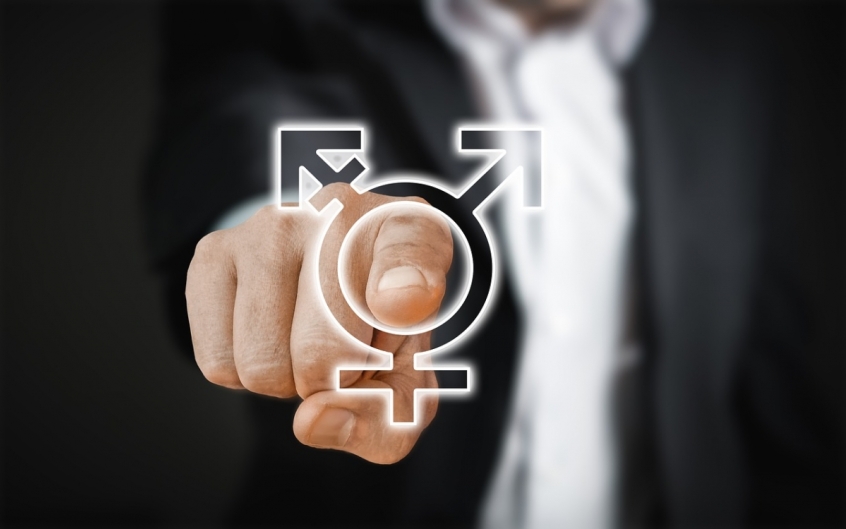I am a Christian who was born with variations in sex characteristics, or what others may call 'intersex traits'. This means that I do not fit into the typical understanding of what it is to be male or female. I am talking about biological characteristics, not to be confused with trans and gender identity.
Intersex is an umbrella term that covers a number of traits, be it in genitals, chromosomes or gonads, and can be found in around 1.7 per cent of the population. Some of these variations are obvious at birth, others may be discovered during puberty or early adulthood, and in some cases not at all.

When I was born, my parents had never heard of children being born intersex and unsurprisingly they struggled to come to terms with my birth. When I was aged one I underwent irreversible surgery at Sheffield Children's Hospital that was largely cosmetic. Even as a young child I knew I was somehow different, and that it was to be kept secret from family and friends. I was a very shy child who lacked confidence, and found it very difficult to make friends.
Later I was referred to Great Ormond Street where I was examined naked in front of medical students, and underwent further cosmetic surgery at 11 years old in a tiny hospital in London's West End, Shaftesbury Hospital. It left me clearly traumatised, and I often fainted during human biology lessons at school.
I was a tomboy, which further stressed my parents, as they were encouraged to raise me like what was considered a 'typical girl'. But raising me this way was not better, as I was still bullied throughout my school years as children sensed I was 'different'. I had little resilience, as the secrecy that surrounded me led me to believe I was something to be ashamed of.
I continued to struggle with anxiety and depression in adulthood. It was not until eight years ago when I was in my 40s that encouraged by my sister-in-law I recovered my medical records and found out the truth. It was hugely liberating, as it enabled me to challenge the secrecy that was so stigmatising.
However, it is not to say all my struggles are behind me as I have faced discrimination in church and from Christians outside church. In the last year I have said to my face that I am 'possessed by Satan', I have had rumours spread about my gender and embodiment in my local diocese, and have been worn down by the constant drip of being called 'disordered'.
In a church context there is no specific pastoral care for intersex children. The church has largely unwittingly 'othered' people from birth just because they do not fit normative assumptions about what is to be made in God's image. This understanding of the image rests on assumptions about how we are embodied, with fixed mental and physical traits, any deviance from which may be considered impure or in need of healing.
I am an Anglican, and just recently the Church of England's Pastoral Advisory Group published its Pastoral Principles for Living Well Together. While a welcome first step, they do not tackle a much more deep-seated problem we find in all denominations. That is that the church does not have sufficient knowledge of the lived experience of intersex people in order to identify when harm is caused and pastoral insensitivity shown.
I will give just one example of an incident in my own diocese. I was invited to talk alongside Prof Peter Hegarty at Surrey University where I shared my life story as an intersex Christian. Four members of diocesan staff were invited, and I am pleased to say they found it very informative, so they asked me to share my story at a diocesan training day. It was then felt necessary to invite the Diocesan Evangelical Fellowship (DEF) to co-host the training day, as they wanted to give the 'alternative view'. The DEF suggested a speaker from the Christian Medical Fellowship who was a surgeon who had operated on children. The diocese failed to understand how the whole idea was deeply upsetting, despite knowing my own personal story of the trauma that resulted from medical examinations and non-consensual, cosmetic surgery. This lack of understanding and sensitivity brought that trauma back to the surface after many years.
The heart of the issue is that church still sees me as problematic, and this is made worse by the fact that church leaders are ill-equipped to deal sensitively with people with intersex traits. In the CofE, the bishops have been slow to reach out to those with expertise and experience, so inevitably their responses to safeguarding and pastoral concerns are inadequate.
The difficulty for the bishops is that I am still judged by some to be 'disordered', someone created as a result of the Fall, someone in need of being corrected or in need of those surgeries that research shows have such detrimental outcomes for countless people's mental and physical health, including mine. Just recently the Church of England Evangelical Council (CEEC) published Glorify God in your Body, which argues that people with intersex traits should be considered 'disordered' using the language of 'defects' and 'abnormalities'. One problem in using these terms is that it pathologises variations which have no need of medical attention (whether surgical or hormone treatments). Alas, attitudes such as these mean that those who do need medical treatments often don't get it, and those who don't need it, do. We know from research that ill-advised pathologisation of all variations has negative mental and physical health outcomes. I would say to the CEEC that we should respect intersex people's rights to self- determination, including their choice of language.
This now brings me to the CofE's Living in Love and Faith project (LLF). There is much to commend in how they are trying to facilitate respectful conversations between those with very different theological positions on same-sex marriage. Intersex has been included in scope, as the Report of the House of Bishops Working Group on Human Sexuality (the 'Pilling Report', 2013) concluded that 'the experiences of those with intersex conditions raise important theological and pastoral issues'.
In here lies the problem. That is, members of LLF are exploring what intersex means to their understanding of gender and sexuality, rather than exploring the needs of intersex people themselves. The core of these conversations should be how good theology can help address our concerns about non-consensual surgeries, secrecy, stigma, and the lack of informed health care.
Intersex has become a 'blind spot' as there is no one with intersex lived experience on any of the working groups, so most these conversations about us are happening without us. This was not what was promised, and it is simply immoral. I welcome recent assurances I have received from bishops and Church House that they commit 'to involving [me] when matters relating to intersex are being explored and written about within the Living in Love and Faith process'. I am extremely relieved by this commitment, as we can really improve intersex people's experience of church by working closer together.
Better conversations will help avoid missteps, such as the recent invitation I received from the LLF, as part of what they term the 'wider participation phase'. In it they are asking me to respond to four questions by email from which they take excerpts when reporting back to bishops and members of the working groups. The questions ask 'what resources I would find appealing and help [me] think and learn more deeply about human identity' and 'what questions [do] you and your peers have'. I was deeply frustrated that the bishops did not first ask what they can learn from my experience. Their knowledge is still inadequate, as I had to explain that intersex has nothing to do with trans and gender identity in response to documentation I had read on the CofE LLF website. There is still little understanding of how our concerns are very different from those of LGBT Christians.
It is time to listen to simple churchgoers like me, who do not hold positions of power and authority, but whose experience needs to be heard. Many intersex people are overcoming the secrecy and stigma and finding their voices outside church, and life outside the church is improving immeasurably for people born with variations in sex characteristics. It is time to recognise that God is acting beyond the church in order to speak to us who are within it.
To finish on a note of optimism, I say this to fellow Christians with intersex traits. There are an increasing number of churches that provide an unconditional welcome, where you can worship without the fear of being stigmatised or mocked. Often church fails, but always in God we experience 'agape', the highest form of love.
Sara Gillingham is a lay member of Guildford Diocese who raises awareness of issues faced by people born with intersex traits.













